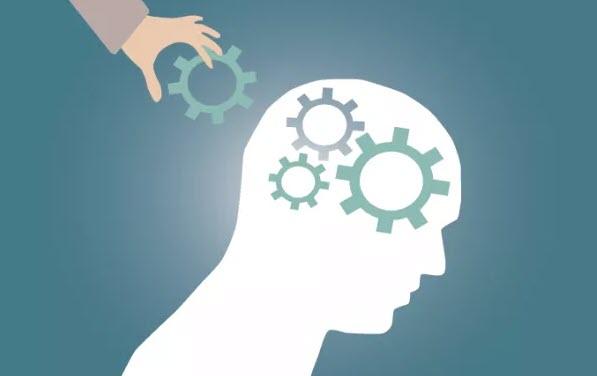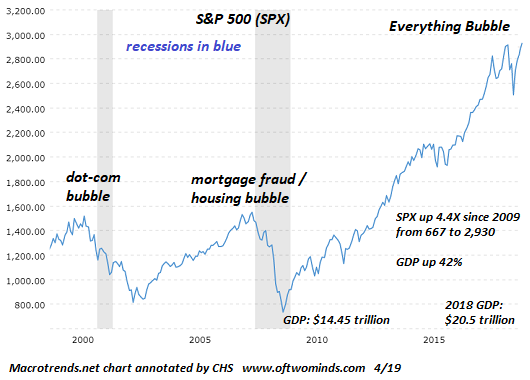Authored by Charles Hugh Smith via OfTwoMinds blog,
That we fall for the fakes and cons is understandable, given that’s all we have left in the public sphere.
What do we mean when we say corporate media is fake? We mean it’s a carefully crafted con, a set of narratives, cherry-picked data and heavily massaged statistics (the unemployment rate, etc.) designed to instill the reader’s confidence in a narrative that serves the interests not of the citizenry but of a select few pillaging the citizenry.
Once upon a time in America, no adult could survive without a finely tuned BS detector. Herman Melville masterfully captured America’s culture of cons and con artists in his 1857 classic The Confidence-Man, which I discussed in The Con in Confidence (October 4, 2006).
An essential component of the American ethos is: don’t be a chump. Don’t fall for the con. And if you do, it’s your own fault. America in 1857 was a simmering stew of con artists, flim-flammers and grifters exploiting the naive, the trusting and the credulous, and that remains the case in 2019.
We now inhabit a world where virtually everything is a con. That “organic” produce from some other country–did anyone test the soil the produce grew in? It could be loaded with heavy metals and be certified “organic” because no pesticides were used during production. Are there any nutrients left in the soil or has it been depleted? What’s in the water used to irrigate the crops?
The point of the con in offshored “organic” is the higher prices fetched. This is why it’s critical to ask of every narrative, story, product and data set: cui bono, to whose benefit?
The employment/unemployment statistics are obviously a con. 93 million people aren’t even counted any more–they’re statistical zombies, no longer among the living workforce. If the unemployment rate were calculated on the number of full-time jobs and the true workforce (everyone ages 18 – 70 that isn’t institutionalized or in prison), the unemployment rate would not be the absurdly delusional 3.7% claimed by the bureaucratic con artists.
“Healthy choice” snacks: fake: loaded with the same low-quality ingredients and high salt content as junk food.
Social media privacy: fake: we really really really keep all your data private, except for what we sell to marketers for immense profits, which is, well, all of it.
Democracy: fake: the live entertainment of elections sells a lot of ads and enriches the corporate media, but nothing actually changes: the Deep State runs the federal government and Deep Pockets run state and local government.
Prosperity: fake: trillions of dollars in new currency and credit have inflated assets to absurd levels, all to create the illusion that everything’s getting better in every way, every day. (See chart below of the “everything bubble”: $1 million decaying bungalows, stocks at all time highs, etc. )
Melville understood that we want to be conned: we want to believe the elixir will make our aches and pains go away, that the new face in politics will clear out the rot of corruption, that rising prices for everything means we’re getting richer and so on.
Orson Welles’ weird and wonderful documentary F for Fake reminds us that a successful fake is essentially identical with the real thing: so the S&P 500 hitting 3,000 means we’re all getting more prosperous, right?
Despite all the craftsmanship, though, fake is still fake. And today virtually everything is fake, a con designed to trick or distract the marks (us) from the looting, plundering and predation of those running the con for their own self-interest.
That we fall for the fakes and cons is understandable, given that’s all we have left in the public sphere.
* * *
Pathfinding our Destiny: Preventing the Final Fall of Our Democratic Republic ($6.95 ebook, $12 print, $13.08 audiobook): Read the first section for free in PDF format. My new mystery The Adventures of the Consulting Philosopher: The Disappearance of Drake is a ridiculously affordable $1.29 (Kindle) or $8.95 (print); read the first chapters for free (PDF). My book Money and Work Unchained is now $6.95 for the Kindle ebook and $15 for the print edition. Read the first section for free in PDF format. If you found value in this content, please join me in seeking solutions by becoming a $1/month patron of my work via patreon.com. New benefit for subscribers/patrons: a monthly Q&A where I respond to your questions/topics.
via ZeroHedge News https://ift.tt/2y6N9Dx Tyler Durden

